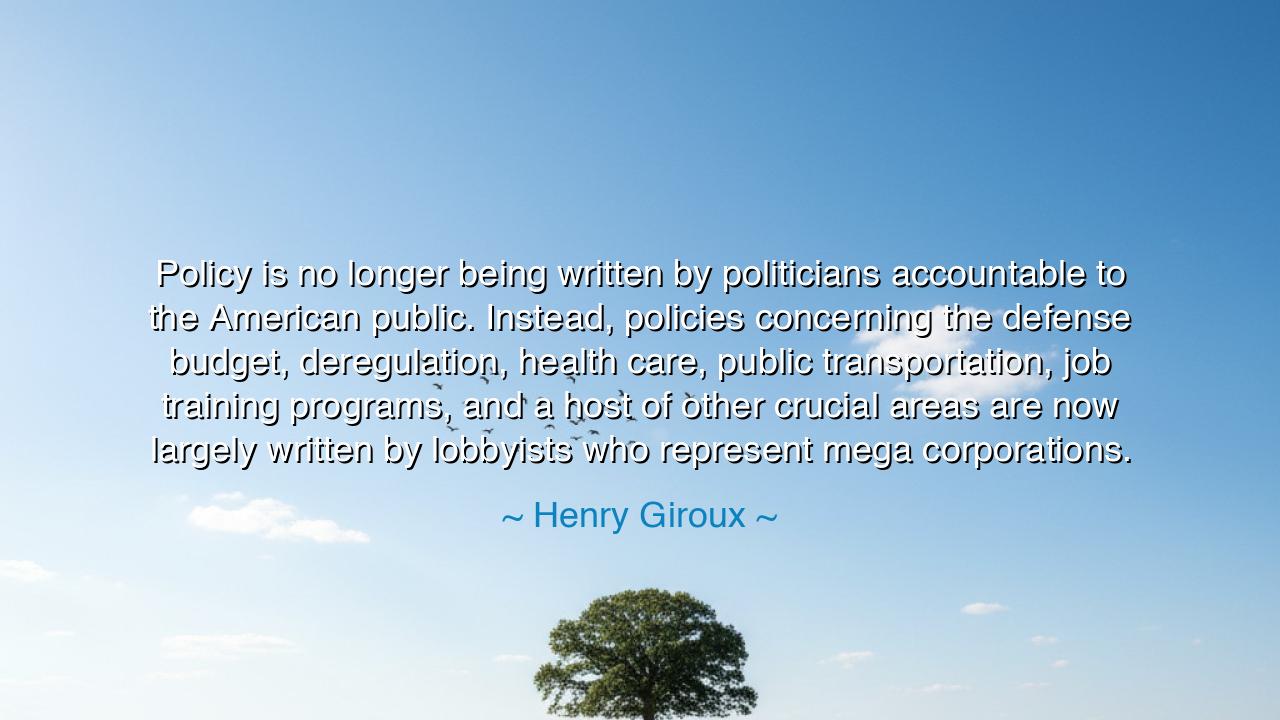
Policy is no longer being written by politicians accountable to
Policy is no longer being written by politicians accountable to the American public. Instead, policies concerning the defense budget, deregulation, health care, public transportation, job training programs, and a host of other crucial areas are now largely written by lobbyists who represent mega corporations.






“Policy is no longer being written by politicians accountable to the American public. Instead, policies concerning the defense budget, deregulation, health care, public transportation, job training programs, and a host of other crucial areas are now largely written by lobbyists who represent mega corporations.” – Henry Giroux
In these grave and powerful words, Henry Giroux, a scholar and moral voice of our age, lays bare a truth that echoes like thunder across the modern world. He speaks of a kingdom of shadows, where power no longer rests in the hands of the people, but in the grasp of those who hide behind the gilded doors of wealth. His words are not the cry of a cynic, but the warning of a sentinel—one who sees that democracy, once the pride of free nations, is being hollowed out from within. Giroux reminds us that policy, once shaped by the will of citizens, has been seized by lobbyists and mega corporations, whose allegiance is not to justice or humanity, but to profit alone.
In the old days, the dream of democracy was a sacred fire. The founders of nations believed that the voice of the many would guide the course of the whole. Laws were meant to rise from the soil of the people’s labor, to protect their homes, their health, their future. But Giroux laments that this vision has been betrayed. The politician, once the servant of the people, has become the servant of moneyed interests. The halls of government now echo with the whisper of deals struck in secret, and the pen that writes the law is guided not by conscience, but by contracts.
We have seen this tale before in the long scroll of history. In the last days of the Roman Republic, senators who once swore to defend the state sold their loyalty to the wealthy patricians. Gold replaced the ballot; influence devoured honor. Rome fell not in a single day of invasion, but in the slow corrosion of its own ideals. So too, Giroux warns, may modern nations perish—not from foreign armies, but from the rot of corporate power that eats away at the foundation of civic trust. When the public good is traded for private gain, the soul of a nation begins to wither.
Consider the example of the Gilded Age in America, when railroads, steel, and oil magnates wielded such vast influence that the law bent before them. Workers toiled twelve-hour days, children labored in factories, and corruption ran like poison through the bloodstream of the Republic. Yet, from that darkness rose reformers—the Progressives, who fought to reclaim the promise of democracy. They broke the monopolies, passed labor laws, and demanded accountability. Their struggle shows us that the power of citizens, once awakened, can indeed challenge the empire of greed. Giroux’s words are a call to summon that same spirit once more.
When he speaks of defense budgets, deregulation, health care, and public transportation, Giroux is naming not abstractions, but the very lifelines of a society. These are the pillars that uphold human dignity—education for the mind, medicine for the body, work for the hands, and justice for the soul. Yet, when these are governed not by the needs of the people but by the desires of corporations, the sacred balance of the social order collapses. The poor grow poorer, the sick grow sicker, and the citizens become subjects once again—this time, not to kings of blood, but to kings of commerce.
And yet, Giroux’s lament is also an invitation to awakening. For every age of corruption births an age of resistance. The people are not powerless. The same spirit that overthrew tyrants, ended segregation, and expanded rights still burns within us. But it must be rekindled through awareness and courage. We must demand transparency in government, support leaders who serve the common good, and educate ourselves and others in the art of civic responsibility. Democracy dies in silence, but it thrives in dialogue, in vigilance, in the refusal to surrender the voice of the many to the greed of the few.
So let these words of Henry Giroux echo through the generations: “Policy is no longer being written by politicians accountable to the American public.” Let this not be accepted as despair, but as a challenge—a reminder that freedom, once gained, must forever be defended. Each citizen must become a guardian of justice, each voice a torch in the darkness. For when the people rise to reclaim what is theirs, even the mightiest corporations tremble. The lesson of the ancients still holds true: power belongs to those who dare to wield it with truth, wisdom, and courage.
Thus, remember this teaching: never yield your future to those who see you only as a market, not as a soul. Question what you are told. Learn who writes the laws that shape your life. Speak not with anger, but with purpose, and stand beside those who seek equity over profit. For if enough hearts burn with the fire of justice, the pen of policy will again serve the people—and democracy will rise, renewed and radiant, from the ashes of its own forgetting.






AAdministratorAdministrator
Welcome, honored guests. Please leave a comment, we will respond soon